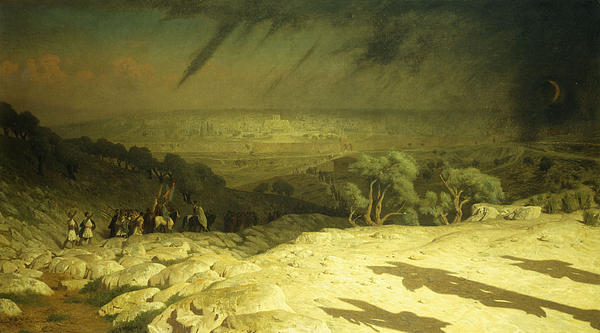Holy Saturday: A Day of Waiting
Forlorn: women before Christ’s sepulchre, an engraving published in Le Magasin Pittoresque, Paris, 1845
And yet, Holy Saturday may be the most relatable day in all of Christian theology: the day when God is silent.
It is the day of in-betweenness—the great pause between crucifixion and resurrection, death and life, despair and joy. Jesus lies in the tomb. The disciples hide in fear. The world holds its breath.
The Silence of God
Theologically, Holy Saturday confronts us with divine silence. Christ is dead. The Word through whom all things were made is mute. This silence echoes through the Psalms—“Why, O Lord, do you stand far away?” (Psalm 10:1)—and through our lives. Who among us has not prayed into silence, wept into emptiness, waited for God to answer and heard nothing?
Holy Saturday gives that silence a place in the liturgical rhythm of the Church. It is not a failure of faith to sit in that space. It is, in fact, a holy place. The Creed affirms it: “He descended into hell.” Christ enters even into the deepest absence—the place of the dead. In doing so, He hallows even our darkest waiting.
The Hidden Work of God
Though it is a day of stillness on the surface, Holy Saturday is not devoid of divine activity. The ancient Church called this “the harrowing of hell,” when Christ descended to the realm of the dead, breaking the gates of Hades, and leading captives into freedom (cf. 1 Peter 3:19-20, Ephesians 4:9-10). Iconography often depicts Jesus grasping the wrists of Adam and Eve, raising them from their graves. Even in death, God is not inactive.
In our waiting, in our unknowing, God is at work. Holy Saturday reminds us that the most important things happen beneath the surface. Seeds grow underground. Healing begins before we feel it. Redemption may be unfolding even when resurrection feels impossibly far away.
The Hope That Waits
Holy Saturday is a theology of hope, not optimism, which looks for quick fixes, but hope, which waits. It is a hope that holds vigil in the dark, trusting that Easter will come not because we can make it happen, but because God has promised it.
Hope on Holy Saturday is not loud. It doesn’t shout alleluia or trumpet victory. It is the candle lit at a tomb. The women are preparing spices, unsure what will come next, but moving forward in love. It is the Church, year after year, sitting in the stillness of Holy Saturday because it knows that silence is not the final word.
A Holy Invitation
Holy Saturday invites us to dwell in the mystery of the “already but not yet.” Christ has died. Christ will rise. But for a moment—an important moment—we wait.
If you are in a season of waiting, if you find yourself between the death of a dream and the birth of a new beginning, Holy Saturday is your day. It tells the truth: that sometimes God is silent. Sometimes we wait in the dark. But it also tells a deeper truth: that God is with us even there.
Because Sunday is coming.



Comments
Post a Comment